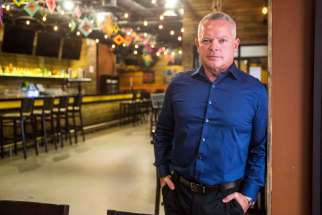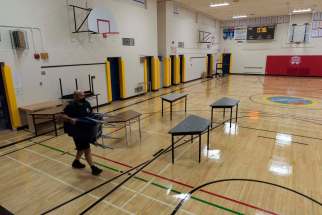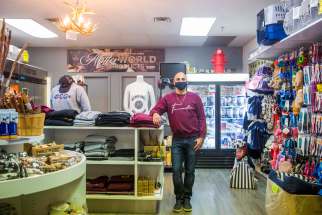Public health buck stops with Pallister
Read this article for free:
or
Already have an account? Log in here »
To continue reading, please subscribe:
Monthly Digital Subscription
$0 for the first 4 weeks*
- Enjoy unlimited reading on winnipegfreepress.com
- Read the E-Edition, our digital replica newspaper
- Access News Break, our award-winning app
- Play interactive puzzles
*No charge for 4 weeks then price increases to the regular rate of $19.00 plus GST every four weeks. Offer available to new and qualified returning subscribers only. Cancel any time.
Monthly Digital Subscription
$4.75/week*
- Enjoy unlimited reading on winnipegfreepress.com
- Read the E-Edition, our digital replica newspaper
- Access News Break, our award-winning app
- Play interactive puzzles
*Billed as $19 plus GST every four weeks. Cancel any time.
To continue reading, please subscribe:
Add Free Press access to your Brandon Sun subscription for only an additional
$1 for the first 4 weeks*
*Your next subscription payment will increase by $1.00 and you will be charged $16.99 plus GST for four weeks. After four weeks, your payment will increase to $23.99 plus GST every four weeks.
Read unlimited articles for free today:
or
Already have an account? Log in here »
Hey there, time traveller!
This article was published 21/10/2020 (1873 days ago), so information in it may no longer be current.
Premier Brian Pallister is not being honest when he says Manitoba’s top doctor has the final say on public health orders.
It’s inaccurate under provincial law, and by convention — and it wasn’t the case when the Pallister government made last-minute changes to pandemic restriction-ordered bar closures this week.
“Public health, obviously, has the hammer; they have the last rock coming home in the last end,” Pallister said Wednesday, when asked about the resulting confusion. “They get to make that call.”
Not exactly.
By law, the chief provincial public health officer cannot issue an order without the health minister signing off on it.
Under Sec. 67(3) of Manitoba’s Public Health Act: “The chief public health officer must not issue a direction or order under clauses (2)(a) to (d.1) without first obtaining the minister’s approval.” That includes closures and travel restrictions under the act’s “public health emergency” section.
Dr. Brent Roussin, the chief provincial public health officer, announced Oct. 16 all beverage rooms, entertainment facilities, casinos and bingo halls would have to close Monday for at least two weeks, to help contain the spread of the novel coronavirus.
There’s little, if any, evidence the virus is spreading faster in those establishments than anywhere else, but in the face of rising COVID-19 caseloads, public health felt new restrictions were necessary. Licensed establishments were seen as the most acceptable targets.
Obviously, someone in government had a different view.
They are tough decisions; judgement calls have to be made. Which is why, by law, final decisions rest with cabinet and the premier.
Backlash followed Roussin’s announcement, and beverage rooms were exempted from the order. The public will never know whether officials in the premier’s office (or others in government) had to twist Roussin’s arm to make the changes, or whether Roussin agreed to a polite request. Communication between the chief public health officer and cabinet is confidential.
Whatever the case, cabinet and the premier had the final say, not Roussin. There’s nothing wrong with that — it is how decisions are made in government.
The top doctor’s job is to provide cabinet with medical advice and to propose public health orders. However, those orders are not made in a vacuum. They’re almost always influenced by other factors (including economic and social).
Closing businesses, not-for-profit organizations and schools (or restricting operations) come with a host of unintended consequences, which have to be considered and weighed against potential public health benefits.
They are tough decisions; judgement calls have to be made. Which is why, by law, final decisions rest with cabinet and the premier.
One of the most glaring examples occurred early in the COVID-19 pandemic, when Roussin announced at a March morning news conference Manitoba schools would not be closed.
Three hours later, another news conference was held; this time with Pallister, Education Minister Kelvin Goertzen, Health Minister Cameron Friesen, and Roussin. Government reversed its decision; schools would be closed.
Roussin offered no additional public health evidence to warrant the move. He simply said, after “further consultation,” he had changed his mind. When Roussin was asked by reporters what tipped the balance, Pallister leaned over and whispered: “I’ll take this.”
What is objectionable, though, is when Pallister claims he doesn’t have the final say over such decisions.
It’s dishonest, and an attempt to deflect unpopular decisions onto civil servants.
“We can err on the side of caution or err on the side of delay,” the premier said that day. “After discussions, we’ve decided to err on the side of caution in some people’s minds.”
Clearly, the premier was involved in reversing the decision, for a host of reasons (including the fact other provinces had already signalled they were closing schools).
There was nothing wrong with the premier exercising authority. He has the legal and moral right to do so. Nobody elected Brent Roussin to office. Elected officials are ultimately accountable to the public, not civil servants.
What is objectionable, though, is when Pallister claims he doesn’t have the final say over such decisions.
It’s dishonest, and an attempt to deflect unpopular decisions onto civil servants.
If there were good reasons to exempt beverage rooms this week, the premier should stand up and say why, and take responsibility for the decision.
Instead of trying to seek political cover, he should explain to the public that, while cabinet carefully considers the advice of the chief public health officer, the buck stops with him.
tom.brodbeck@freepress.mb.ca

Tom has been covering Manitoba politics since the early 1990s and joined the Winnipeg Free Press news team in 2019.
Our newsroom depends on a growing audience of readers to power our journalism. If you are not a paid reader, please consider becoming a subscriber.
Our newsroom depends on its audience of readers to power our journalism. Thank you for your support.






